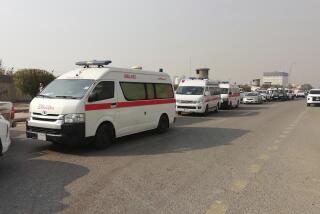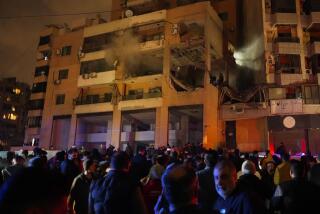Suicide Attack Kills Head of Iraqi Council
- Share via
BAGHDAD — A suicide car bomber assassinated the president of Iraq’s Governing Council on Monday as his vehicle waited to enter the headquarters of the U.S. occupation -- a stark reminder of how vulnerable the country’s leaders are to terrorist attacks with about six weeks to go before sovereignty is scheduled to return to Iraq.
Ezzedine Salim, a soft-spoken independent Shiite Muslim politician, had held the rotating presidency for two weeks before a bomber drove to one of the two entrances routinely used by council members to enter the U.S.-controlled Green Zone. The attacker detonated his car as Salim was about to enter the zone to attend a council meeting, killing seven other civilians and injuring at least five.
Salim, who was also known as Abdul Zahra Othman, is the second council member to be assassinated. Violence against Iraqi political figures -- whether at the local or national level -- has become commonplace as the June 30 deadline for the hand-over approaches. Police chiefs, city council members, provincial council deputies and judges have been killed, along with a host of Kurdish political leaders.
Council members immediately expressed outrage at the suicide attack, but unlike after earlier bombings, they emphasized that they were determined to see Iraqis take control of the country on schedule. Although the council will dissolve, many members hope to become part of the interim government.
“It’s a great loss to our people and their aspirations,” said Ghazi Ajil Yawer, a Sunni Muslim civil engineer and council member, who was selected to take over as president. “We will not retreat from the march ... toward freedom and happiness for our people.”
Foreign Minister Hoshyar Zebari, a Kurd, who was in Jordan for the World Economic Forum, told reporters that the bombing would not derail the political process but rather would “strengthen our resolve.”
U.S. leaders quickly joined the chorus asserting that the hand-over of sovereignty would occur on schedule.
“The Governing Council ... has not been intimidated, it has not been defeated,” Defense Secretary Donald H. Rumsfeld said in an appearance at the Heritage Foundation in Washington. “And we must not allow terrorists or regime remnants to determine the fate of 25 million Iraqis.”
In September, Aqila Hashimi, a Shiite Muslim and one of three women on the council, was fatally injured by gunfire during an attack on her convoy near her Baghdad home.
A month earlier, Ayatollah Mohammed Bakr Hakim, who led the Supreme Council for Islamic Revolution in Iraq, one of the first political parties to become part of the Governing Council, was assassinated at the Imam Ali shrine in Najaf in a bombing that killed more than 90 people. His brother, Abdelaziz, is a Governing Council member.
Salim had been friendly with Ayatollah Hakim: Both had lived for many years in Iran, and though at the time of their deaths they were connected to different parties, they shared similar views, according to friends in the Dawa Party.
The pattern of violence that took their lives seemed unlikely to change anytime soon. Even after the hand-over of sovereignty, it is widely acknowledged that Iraq’s security forces, even with help from U.S. troops, will be unable to stop determined terrorists. And, since Iraq will still not have an elected government after June 30, terrorists are expected to continue their efforts at intimidation.
It was the third suicide bombing at an entrance to the U.S.-led coalition compound and the second such attack in two weeks.
The vehicles of two other council members also in line were unaffected. Council member Adnan Pachachi had just entered the Green Zone.
It was unclear late Monday whether Salim was targeted personally or because he was president. The presidency rotates among 11 council members, and each gets the same dark green, armored car to use. Though armored cars can withstand bullets and even some improvised explosive devices, they cannot protect occupants against suicide car bombs.
Accusations as well as claims of responsibility came quickly, although it was doubtful that the culprits would be known for some time, if ever.
A previously unknown group, calling itself the Arab Resistance Movement, claimed responsibility for the bombing, saying in a website posting that two of its fighters carried out the operation against “the traitor and mercenary” Salim, according to Associated Press.
But some Governing Council members blamed officials of former President Saddam Hussein’s government. A few also blamed the U.S. for creating a haven by turning over the embattled city of Fallouja to former members of Hussein’s regime.
“The CPA is responsible for security,” said Ahmad Chalabi, head of the Iraqi National Congress party and a staunch U.S. ally. “The allies of the United States are hampered by the law from protecting ourselves, but the terrorists are free to roam around and have been given sanctuary in Fallouja.”
In Al Anbar province, which includes Fallouja, two American service members were killed in action Monday, military officials said. More than 780 U.S. troops have died in the conflict.
Spokesmen for the U.S.-led coalition said that the car bombing in Baghdad bore some markers of Abu Musab Zarqawi, a Palestinian-Jordanian militant who is believed to have trained with Al Qaeda and is thought to be leading terrorist attacks in Iraq.
Dan Senor, a coalition spokesman, said that Salim had chosen to use his cousins and nephews as his security detail rather than hiring professionals. Also, according to U.S. records, no one in his security detail had taken courses in close protection training offered by the coalition.
It is doubtful, however, whether such training would have made much difference in the face of a suicide bomber.
Brig. Gen. Mark Kimmitt said early indications are that the bomb was made of artillery shells pieced together to create a spectacular explosion.
When the bomb went off, it shook buildings and windows almost two miles away. The blast left a 5-foot-long crater outside the gate, destroying 17 cars including Salim’s.
The violence of the attack on a man known for his gentle manner shocked his colleagues. “He was a close friend and ally in terms of his vision for Iraq, for a pluralistic Iraq,” said human rights minister Bakhtiar Amin. “He was respected by all his colleagues. He was a modest person and a modest personality.”
Salim was a slight man with a neatly trimmed graying beard, who after more than 20 years of living in Tehran, favored the Iranian style of wearing simple western suits with buttoned-down shirts but without a tie. He had been encouraged to join the Governing Council by Mohammed Bakr Hakim.
A native of Basra, he was born Abdul Zahra Othman in 1943, according to an online encyclopedia, and while still a young man became involved in politics and studying Islamic thought and religion. Active in the Dawa Party, which staunchly opposed the Baathists, Salim was known as a philosopher who wrote extensively on the confluence of Sunni and Shiite thought.
Targeted by Hussein and his supporters as they gained power, he fled to Kuwait, where he taught history and continued to write. He married and had eight children -- four boys and four girls.
“He was always opposed both to sectarianism and to nationalism,” said Walid Shahib Hilli, general manager of the Iraqi Dawa Party office, who knew Salim well. After Salim had spent a short time in Kuwait, Hussein’s secret service, the Mukhabarat, pursued him and he fled again, this time to Tehran. He also changed his name to Ezzedine Salim, to make it harder for his enemies to track him.
The Dawa Party split, and he was affiliated with the less prominent branch, but was well-known for his writing and well-liked for his moderate approach, which emphasized the unity of the country rather than the supremacy of political ideas.
Adel Abdul Mehdi, the deputy representative of the Supreme Council for the Islamic Republic in Iraq, who was close to Salim, described him as a man who “cared about the deep ideas. He was a conciliator; he accepted others’ views and he would work with them.”
More to Read
Sign up for Essential California
The most important California stories and recommendations in your inbox every morning.
You may occasionally receive promotional content from the Los Angeles Times.













